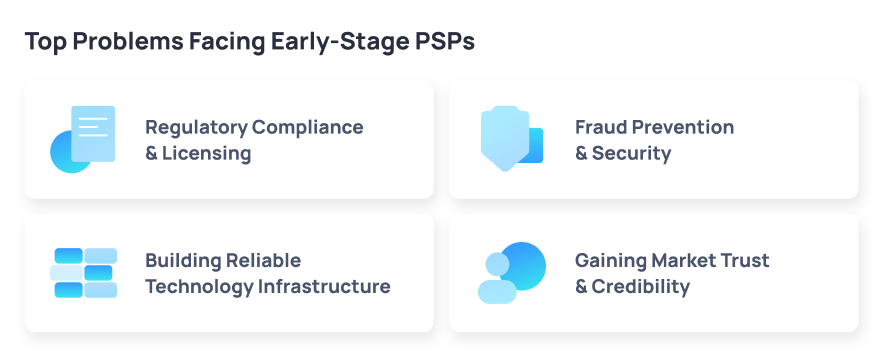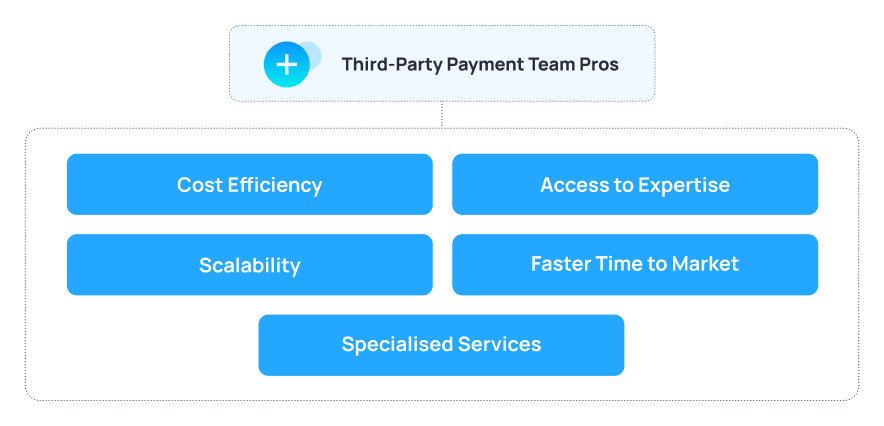
The fintech industry is rapidly growing, with PSPs playing a vital role by enabling businesses to accept various electronic payments seamlessly. This market is experiencing significant growth, with projections showing it will expand from $38.2 billion in 2023 to $108.5 billion by 2032, at a CAGR of 12.3%. As the digital payment market becomes more competitive, early-stage PSPs face challenges that highlight the need for effective growth strategies. In this article we will explore the role of the experienced payment teams in early-stage PSP development and provide tips on how to make the PSP’s growth process more smooth and effective.
Top Problems Facing Early-Stage PSPs

Regulatory Compliance and Licensing
Compliance remains a significant challenge for PSPs, particularly given the expanding regulatory landscape. As digital payments proliferate, regulatory bodies are stepping up their requirements to protect against fraud and ensure customer data security. Adhering to standards like PCI DSS and AML is essential, but for early-stage PSPs addressing these requirements can be both costly and complex.
Fraud Prevention and Security
Fraud prevention is increasingly critical as PSPs handle higher transaction volumes. Antifraud features have become integral to detecting and preventing fraud, with many PSPs investing in these technologies to stay ahead of sophisticated cyber threats. This trend is set to continue as PSPs recognise that a robust fraud prevention system is vital for maintaining market trust and minimising risks.
Building Reliable Technology Infrastructure
With the global PSP market expected to grow significantly, the ability to scale infrastructure efficiently is crucial. Early-stage PSPs often struggle to build the resilient technology stacks needed to handle increasing transaction volumes, particularly with rising demand for mobile and cross-border payments. This infrastructure must be both scalable and secure, requiring significant investment and expertise.
Gaining Market Trust and Credibility
Trust is crucial for PSPs, especially new entrants. With the market becoming more saturated and competitive, early-stage PSPs must prove their reliability quickly to attract merchants and gain their loyalty. As of 2024, the growing number of fintech startups highlights the intense competition, which makes it harder for new PSPs to establish a reputation and secure partnerships.
Why an Experienced Payment Team is Essential
Informed Strategic Decisions
An experienced payment team provides insights that guide business and product development, enabling PSPs to adapt to a rapidly changing market. They bring a deep understanding of industry trends and competitive pressures, allowing early-stage PSPs to make strategic decisions that align with market demands.
Enhanced Operational Efficiency
Efficient payment operations are fundamental to maintaining customer satisfaction and scaling effectively. Seasoned professionals can streamline transaction processes and introduce best practices that improve speed and accuracy. For instance, global digital transaction volumes are expected to continue rising, meaning PSPs will need to handle increasingly complex transactions efficiently to remain competitive.
Regulatory Compliance
Keeping track of the regulatory environment is critical for PSPs. With new regulations emerging in response to the rise of digital payments, experienced teams are invaluable for ensuring compliance. They help early-stage PSPs stay ahead of regulatory changes, which is essential as PSPs expand into international markets where compliance requirements can vary significantly.
Robust Fraud Prevention and Security
As cyber threats become more sophisticated, early-stage PSPs need experienced professionals to implement effective fraud prevention measures. Given the anticipated growth in the digital payments sector, advanced fraud detection technologies are increasingly vital for minimising risk and maintaining a secure payment infrastructure.
Third-Party Payment Team: Pros and Cons
As early-stage PSPs could meet the complexities of regulatory compliance, fraud prevention, and infrastructure scalability, partnering with a third-party payment team can offer significant advantages. However, like any business decision, it comes with both benefits and drawbacks. Here’s a breakdown of the pros and cons.
Pros:

Cost Efficiency
For early-stage PSPs, building an in-house team of experts can be prohibitively expensive. By partnering with third-party providers through a third-party payment team, PSPs can access experienced professionals at a fraction of the cost. This approach offers significant cost savings while providing the expertise needed to operate at the market.
Access to Expertise
A third-party payment team provides access to highly skilled professionals who understand the nuances of the PSP landscape. With the global PSP market set to expand rapidly, leveraging the knowledge of industry veterans can help early-stage PSPs refine their offerings and position themselves competitively.
Scalability
Scalability is a significant advantage of third-party payment teams, allowing PSPs to scale their operations in response to market demands without the constraints of an in-house team. This flexibility is particularly valuable as the PSP market continues to grow and transaction volumes increase, demanding more robust and scalable infrastructure.
Faster Time to Market
By partnering with a third-party team, PSPs can speed up their time to market. Experienced external teams come with pre-existing knowledge and frameworks, allowing for faster implementation of payment systems and compliance measures. This helps early-stage PSPs get their services up and running more quickly.
Specialised Services
Third-party providers offer a wide range of specialised services, including fraud prevention, acquirer selection, payment routing optimisation, and custom development. These services help PSPs enhance their operational efficiency and improve transaction success rates, providing a better overall experience for merchant.
Cons:

Slower reaction
Outsourcing key functions to a third-party team can sometimes result in slower reactions if something should be done quickly . While these teams are experts, early-stage PSPs may find it challenging to manage or monitor third-party processes as closely as they would with an in-house team. This could potentially lead to slower reaction times when resolving issues or implementing changes.
Integration Challenges
While Third-party providers can help PSPs scale quickly, integrating their services with existing systems may require significant technical effort. In some cases, compatibility issues may arise, leading to delays or disruptions during the onboarding or migration process. Moreover, customisation requests might not always be fully aligned with the specific needs of the PSP. That is why you should look for a partner, who offers quick integration with your system.
Dependency
Relying on a third-party provider means that the success of a PSP’s payment operations is partially dependent on the performance and stability of that provider. Any operational issues or delays on the provider’s side can directly impact the PSP’s ability to function smoothly, which can affect customer satisfaction and revenue. In this case, focus on reliability of the partner is vital.
Conclusion
In 2024 the PSP market is poised for significant growth, driven by increasing digital payment adoption and technological advancements. For early-stage PSPs, these trends present both opportunities and challenges. An experienced payment team is essential for addressing the complexities of the market, from compliance and fraud prevention to operational scalability. However, building such a team internally can be costly. Third-party providers offer a viable alternative, providing access to seasoned professionals who can enhance efficiency, reduce costs, and enable early-stage PSPs to compete in a growing industry. With these tools, PSPs can focus on innovation and growth, ensuring they remain competitive in a booming digital payments landscape. Considering a third-party partner or own payment team is challenging and depends on the specificities of every business model. Nevertheless, our tips are showing the common features and drawbacks of both variants. If you have any additional questions, just fill out the contact form below and our team will help in choosing the best option for you.
Sources:
Transferty’s internal analytics
Reports and Insights: “Payment Service Provider Market Report, 2024-2032”
FinTech Weekly: “PSP Ecosystem Explained and Global Mapping of Key Players”
Innoven Capital: “Early-Stage Investment Insight Report 2024”







